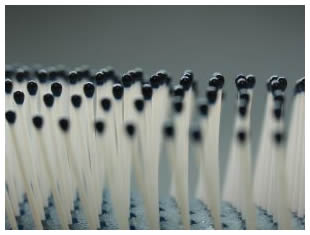 Kathleen cannot leave the house without repeatedly checking that she has locked the front door properly. She rattles the door over and over again to assure herself that the door is locked. She will start to leave the premises only to return up the front steps again to reassure herself that the door is, in fact, locked. She may repeat this more than once.
Kathleen cannot leave the house without repeatedly checking that she has locked the front door properly. She rattles the door over and over again to assure herself that the door is locked. She will start to leave the premises only to return up the front steps again to reassure herself that the door is, in fact, locked. She may repeat this more than once.
Helen cannot bear to use a towel once it has already been used, even if it has only been used just once to wipe her own hands. It has to be replaced immediately. She also cannot control the anxiety she feels about the wet towels of her family members – those towels must also be taken to the laundry and washed. When she takes a shower, she uses several towels to dry herself because she can’t bear the feel of a dampened towel on her body, so after a typical shower there may be a pile of four or five towels needing to be washed. And because she cannot stand the feel of these dirty, wet towels, someone else must wash them for her.
Kevin has an overdeveloped fear of germs. A dentist, he has always been in the habit of washing his hands regularly, but recently it has become much more than just a cleanliness issue. He is washing his hands repeatedly, even in the middle of a dental procedure, or he may wash his hands three or four times in a row.
Kathleen, Helen, and Kevin all suffer from Obsessive-Compulsive Disorder (OCD) which, in its most severe form, is regarded as the most debilitating and distressing of all mental illnesses. It may occur in conjunction with generalized anxiety disorder, panic disorder, and major depression, leaving the sufferer in a painful world of ritual and repetition. Severely afflicted persons cannot leave their homes due to the incessant need to check and recheck, or wash and rewash. It goes without saying that life for these people is highly restrictive, but most importantly, incredibly painful.
Unlike other anxiety disorders, the problem for the OCD sufferer is within themselves—they are not frightened of enclosed spaces, or snakes, or heights. They are frightened of their own thoughts, which naturally makes the condition all-pervasive. It is relatively easy to remove yourself from an environment which may contain a snake, or we can avoid lifts and other confined spaces, but it is impossible to escape one’s own thoughts.
To give a mild example of what this condition can be like, try not to think of a grey elephant. Now, pause for a second or two. What immediate image sprang to mind? An elephant, right? The OCD sufferer fights a continual battle to eradicate thoughts from their mind that profoundly upset them, yet as we can see from the simple example above, it is not all that easy to do. Hence the conclusion by mental health workers that OCD in its severest form is the most debilitating of all the mental illnesses.
In future articles, we will examine more closely the symptoms and available treatment options for sufferers of this puzzling condition.
Contact Beth McHugh for further information or assistance regarding this issue.
Related articles:
Obsessive-Compulsive Disorder: Causes and Treatment
Obsessive-Compulsive Disorder: Origins
Obsessive-Compulsive Disorder: Symptoms and Behaviors

